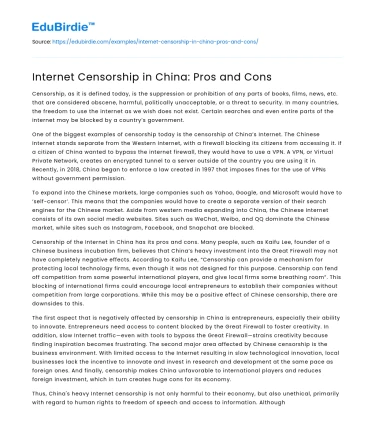Censorship, as it is defined today, is the suppression or prohibition of any parts of books, films, news, etc. that are considered obscene, harmful, politically unacceptable, or a threat to security. In many countries, the freedom to use the internet as we wish does not exist. Certain searches and even entire parts of the internet may be blocked by a country’s government.
One of the biggest examples of censorship today is the censorship of China’s Internet. The Chinese Internet stands separate from the Western Internet, with a firewall blocking its citizens from accessing it. If a citizen of China wanted to bypass the internet firewall, they would have to use a VPN. A VPN, or Virtual Private Network, creates an encrypted tunnel to a server outside of the country you are using it in. Recently, in 2018, China began to enforce a law created in 1997 that imposes fines for the use of VPNs without government permission.
Save your time!
We can take care of your essay
- Proper editing and formatting
- Free revision, title page, and bibliography
- Flexible prices and money-back guarantee
To expand into the Chinese markets, large companies such as Yahoo, Google, and Microsoft would have to ‘self-censor’. This means that the companies would have to create a separate version of their search engines for the Chinese market. Aside from western media expanding into China, the Chinese internet consists of its own social media websites. Sites such as WeChat, Weibo, and QQ dominate the Chinese market, while sites such as Instagram, Facebook, and Snapchat are blocked.
Censorship of the Internet in China has its pros and cons. Many people, such as Kaifu Lee, founder of a Chinese business incubation firm, believes that China’s heavy investment into the Great Firewall may not have completely negative effects. According to Kaifu Lee, “Censorship can provide a mechanism for protecting local technology firms, even though it was not designed for this purpose. Censorship can fend off competition from some powerful international players, and give local firms some breathing room”. This blocking of international firms could encourage local entrepreneurs to establish their companies without competition from large corporations. While this may be a positive effect of Chinese censorship, there are downsides to this.
The first aspect that is negatively affected by censorship in China is entrepreneurs, especially their ability to innovate. Entrepreneurs need access to content blocked by the Great Firewall to foster creativity. In addition, slow Internet traffic—even with tools to bypass the Great Firewall—strains creativity because finding inspiration becomes frustrating. The second major area affected by Chinese censorship is the business environment. With limited access to the Internet resulting in slow technological innovation, local businesses lack the incentive to innovate and invest in research and development at the same pace as foreign ones. And finally, censorship makes China unfavorable to international players and reduces foreign investment, which in turn creates huge cons for its economy.
Thus, China's heavy Internet censorship is not only harmful to their economy, but also unethical, primarily with regard to human rights to freedom of speech and access to information. Although this policy has certain pros, significant cons still prevail.






 Stuck on your essay?
Stuck on your essay?

